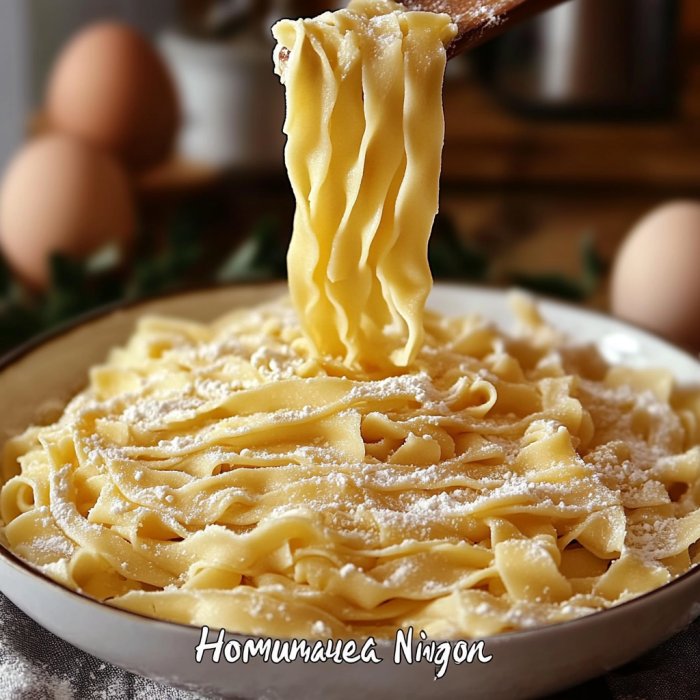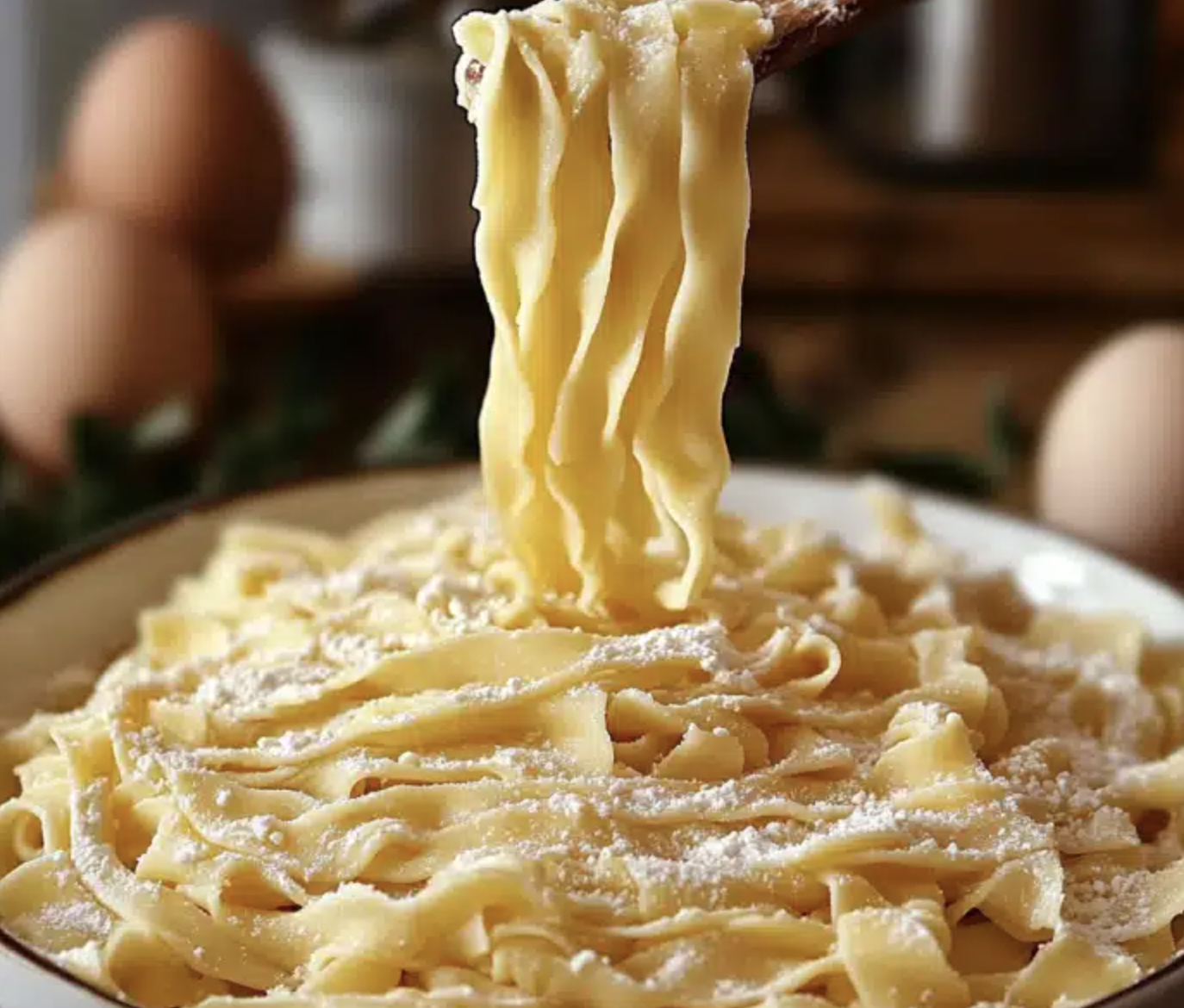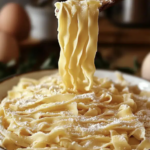Homemade egg noodles are a delightful addition to any kitchen repertoire. With their rich, hearty texture and ability to soak up flavors, they elevate even the simplest dishes. Whether you’re making chicken noodle soup, stroganoff, or just enjoying them with butter and herbs, this homemade egg noodle recipe will become a family favorite. Let’s dive into the process of creating these delicious noodles from scratch.
Ingredients
To make your own homemade egg noodles, you’ll need just a few simple ingredients:
- 2 cups of all-purpose flour
- 2 large eggs
- 1/4 cup of water
- 1 teaspoon of salt
- 1 tablespoon of vegetable oil (optional)
Instructions

Step 1: Prepare the Dough
- Mix the Dry Ingredients: In a large mixing bowl, combine the all-purpose flour and salt. Stir until well-blended.
- Create a Well: Make a well in the center of the flour mixture. Crack the eggs into the well, then add water and oil (if using).
- Combine Ingredients: Gradually mix the flour into the eggs, water, and oil. Use a fork or your hands to combine the ingredients until a dough forms. If the dough is too sticky, add a little more flour. If it’s too dry, add a small amount of water.
- Knead the Dough: Transfer the dough onto a lightly floured surface. Knead the dough for about 5-7 minutes, until it becomes smooth and elastic. Cover the dough with a clean cloth and let it rest for 20-30 minutes.
Step 2: Roll and Cut the Noodles
- Roll Out the Dough: After resting, divide the dough into two equal portions. On a floured surface, roll out each portion into a thin sheet, about 1/8 inch thick. The thinner you roll the dough, the more delicate your noodles will be.
- Cut the Noodles: Once the dough is rolled out, use a sharp knife or a pizza cutter to cut the dough into strips. You can make the noodles as wide or as narrow as you like, depending on your preference.
- Dry the Noodles (Optional): If you prefer a more al dente texture, allow the noodles to dry for about 30 minutes. You can lay them out on a floured surface or hang them over a clean dish rack.
Step 3: Cook the Noodles
- Boil the Noodles: Bring a large pot of salted water to a boil. Add the noodles to the boiling water and cook for 2-4 minutes, or until they float to the surface and are tender. Be careful not to overcook, as fresh noodles cook quickly.
- Drain and Serve: Drain the noodles in a colander. They are now ready to be used in your favorite recipes or enjoyed simply with a bit of butter and fresh herbs.
Tips for Perfect Homemade Egg Noodles
- Use Fresh Eggs: Fresh eggs give the noodles a richer flavor and better texture.
- Adjust the Thickness: For soups, slightly thicker noodles work well as they hold up better in broth. For dishes like stroganoff, thin noodles are ideal.
- Experiment with Flavors: Add herbs or spices to the dough for an extra flavor boost. For instance, a pinch of garlic powder or chopped parsley can make your noodles even more delicious.
- Storing Leftovers: If you have leftover noodles, dry them completely and store them in an airtight container. They can be stored at room temperature for up to a week or frozen for longer storage.
Conclusion
Making homemade egg noodles from scratch is easier than you might think and yields delicious results that are far superior to store-bought versions. With just a few basic ingredients and some simple steps, you can create noodles that are perfect for a wide variety of dishes. Try this recipe the next time you’re looking to add a homemade touch to your meal, and enjoy the rich, comforting flavors of fresh egg noodles.
Serving and Storage Tips for Homemade Egg Noodles
Serving Suggestions
Homemade egg noodles are incredibly versatile and can be served in various ways. Here are some ideas to inspire your next meal:
- Classic Chicken Noodle Soup: Add your freshly cooked noodles to a steaming bowl of homemade chicken soup for a comforting, hearty meal.
- Beef Stroganoff: Serve the noodles with a creamy beef stroganoff sauce for a rich and satisfying dinner.
- Noodles with Butter and Herbs: Keep it simple by tossing the noodles with melted butter, fresh herbs like parsley or chives, and a sprinkle of Parmesan cheese.
- Stir-Fry: Incorporate the noodles into a stir-fry with vegetables, soy sauce, and your choice of protein for a quick and flavorful meal.
- Creamy Alfredo: Toss the noodles in a rich Alfredo sauce for a delicious and indulgent pasta dish.
- Casseroles: Use the noodles as a base for casseroles, such as tuna noodle casserole or baked ziti.
Storage Tips
Proper storage ensures your homemade egg noodles stay fresh and delicious for as long as possible. Here’s how to store them:
Fresh Noodles
- In the Refrigerator: If you plan to use the noodles within a day or two, store them in an airtight container in the refrigerator. Fresh noodles can be kept in the fridge for up to 2 days.
- In the Freezer: For longer storage, freeze the noodles. Lay them out on a baking sheet in a single layer and freeze until solid. Once frozen, transfer them to a freezer-safe bag or container. Frozen noodles can be stored for up to 2 months. When ready to use, cook them directly from frozen in boiling water; no need to thaw.
Dried Noodles
- Air Drying: If you prefer to dry the noodles for longer storage, spread them out on a clean, dry surface, ensuring they are not touching. Allow them to dry completely, which can take anywhere from 12 to 24 hours, depending on the humidity in your area.
- Storage: Once fully dried, store the noodles in an airtight container or a resealable plastic bag. Keep them in a cool, dry place, like a pantry. Properly dried and stored noodles can last for several months.
Reheating Tips
- Microwave: To reheat refrigerated noodles, place them in a microwave-safe dish with a splash of water or broth, cover with a damp paper towel, and heat in short intervals until warmed through.
- Stovetop: Alternatively, reheat the noodles by sautéing them in a pan with a little butter or oil over medium heat. Add a splash of water or broth to help soften the noodles as they warm up.
Final Thoughts
Homemade egg noodles are not only a joy to make but also a pleasure to serve and store. With the right techniques, you can enjoy them fresh, keep them stored for future meals, and reheat them without losing their delicious texture. Whether you’re making a quick weeknight dinner or preparing for a special occasion, these noodles will add a homemade touch that everyone will love.
1. Can I make homemade egg noodles without a pasta machine?
Yes, you can! Homemade egg noodles can easily be made by hand. After mixing and kneading the dough, simply roll it out with a rolling pin on a floured surface to your desired thickness. Then, use a sharp knife or pizza cutter to slice the dough into noodles. Although a pasta machine can help achieve uniform thickness, it’s not necessary for making delicious egg noodles.
2. How do I prevent my homemade egg noodles from sticking together?
To prevent sticking, make sure to dust your noodles with flour as you cut them. Additionally, when cooking the noodles, stir them gently in boiling water to keep them separated. If you’re storing the noodles, ensure they are well-floured and spread out in a single layer to avoid clumping.
3. Can I add flavors or colors to my homemade egg noodles?
Absolutely! You can add herbs, spices, or even purees to the dough to create flavored or colored noodles. For example, adding spinach puree will give you green noodles, while beet puree can make them pink. Herbs like basil or garlic powder can be mixed into the dough for added flavor. Just adjust the flour as needed to maintain the dough’s consistency.
4. How do I know when my homemade egg noodles are cooked?
Fresh homemade egg noodles cook much faster than dried, store-bought ones. They are typically done in 2-4 minutes of boiling. You’ll know they’re ready when they float to the top of the pot and have a tender yet firm texture. Taste one to ensure it’s cooked to your liking before draining the noodles.
PrintHomemade Egg Noodles
These homemade egg noodles are tender, versatile, and incredibly easy to make with just a few ingredients. Perfect for soups, casseroles, or as a standalone pasta dish, they bring a homemade touch to any meal.
- Prep Time: 5 minutes
- Chill Time: 20 minutes
- Cook Time: 30 minutes
- Total Time: 55 minutes
- Yield: 4 servings 1x
- Category: Side Dish
- Cuisine: American, European
Ingredients
- 2 cups (250 g) all-purpose flour
- 1/2 teaspoon salt
- 3 large eggs
- 1–2 tablespoons water (as needed)
Instructions
1. Make the Dough:
- Mix the Dry Ingredients:
In a large mixing bowl, combine the flour and salt. - Add the Eggs:
Create a well in the center of the flour and crack the eggs into it. Use a fork to beat the eggs lightly, then gradually incorporate the flour from the edges of the well until a rough dough forms. - Knead the Dough:
Transfer the dough to a lightly floured surface. Knead for about 8–10 minutes, or until the dough is smooth and elastic. If the dough is too dry, add water 1 teaspoon at a time. If it’s too sticky, sprinkle with a little more flour. - Rest the Dough:
Wrap the dough in plastic wrap or cover it with a clean kitchen towel. Let it rest for at least 30 minutes at room temperature. This allows the gluten to relax and makes the dough easier to roll out.
2. Roll and Cut the Noodles:
- Roll the Dough:
Divide the dough into two portions for easier handling. Roll out one portion on a floured surface to your desired thickness (thin for soups, thicker for heartier dishes). - Cut the Noodles:
Use a sharp knife, pizza cutter, or pasta cutter to slice the rolled dough into strips of your desired width (e.g., thin for soups, wide for stroganoff). Toss the noodles lightly in flour to prevent sticking.
3. Cook the Noodles:
- Boil the Noodles:
Bring a large pot of salted water or broth to a boil. Add the noodles and cook for 2–4 minutes, depending on their thickness, until tender. Drain and serve immediately.
Notes
- Storage: Uncooked noodles can be stored in an airtight container in the refrigerator for up to 2 days or frozen for up to 2 months.
- Drying: For long-term storage, allow the noodles to dry completely before storing in an airtight container.
- Add herbs like parsley or spices to the dough for extra flavor.


